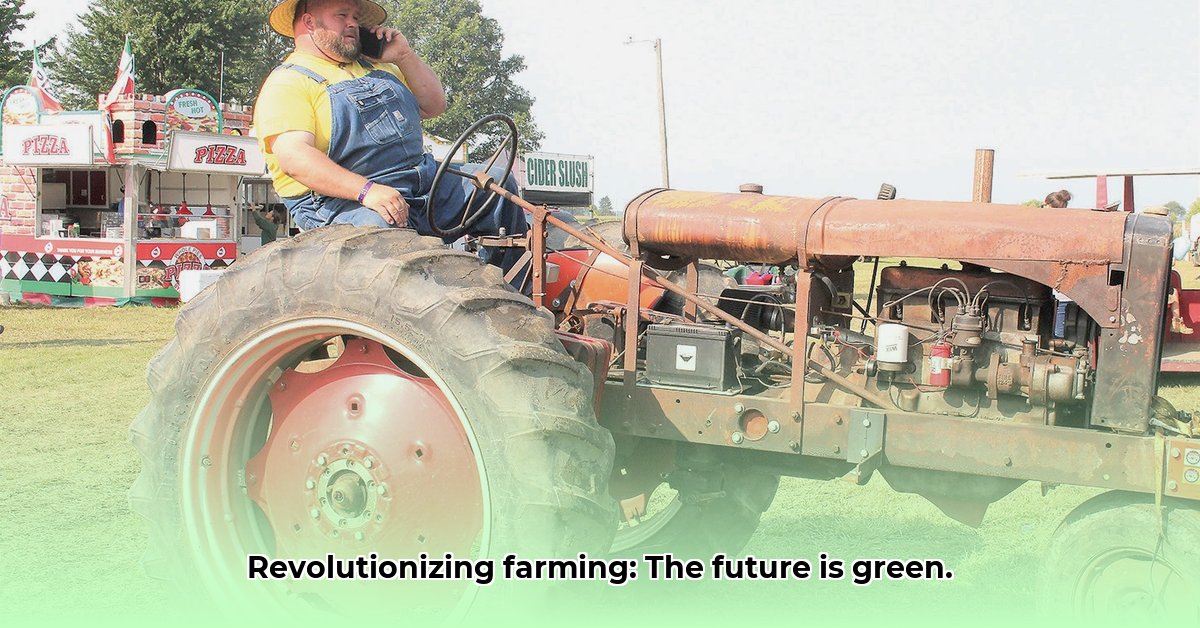
Gasoline Tractors: A Century of Change on the Farm
The roar of a gasoline tractor—a sound synonymous with modern farming for over a century—presents a paradox. It signifies progress and increased food production, yet simultaneously raises critical questions about environmental sustainability. This article explores the complex relationship between gasoline tractors and sustainable agriculture, tracing their evolution and assessing their impact on the planet. For more on early tractor models, check out this site on International Harvester 66 series tractors.
The Dawn of a Mechanical Revolution
Before the internal combustion engine revolutionized agriculture, farming was a labor-intensive process, reliant on human and animal power. Limited yields and backbreaking work were the norm. Then, in 1892, John Froelich's invention, the first truly practical gasoline tractor, emerged. This gasoline-powered machine promised – and delivered – a dramatic increase in speed, efficiency, and land cultivation potential, forever altering the agricultural landscape. However, the long-term ecological consequences of this technological leap remained largely unexplored.
The Golden Age of Farming – and its Growing Pains
The early 1900s witnessed the widespread adoption of gasoline tractors, leading to a surge in agricultural productivity and a decrease in labor costs. Larger farms became viable, reshaping the industry. But this agricultural boom came at a cost. The increased reliance on fossil fuels raised significant environmental concerns, notably escalating greenhouse gas emissions. Moreover, the increased efficiency encouraged practices like monoculture farming, depleting soil nutrients and increasing erosion. The initial benefits, it became clear, were offset by long-term environmental consequences.
A Constant Tug-of-War: Power vs. Planet
Subsequent decades saw continuous innovation in tractor design, resulting in more powerful and fuel-efficient engines. New technologies boosted precision, further increasing productivity. Yet, the core reliance on fossil fuels persisted, creating an ongoing tension between the need for increased food production and the urgency of environmental sustainability. This remains a central challenge in modern agriculture. How can we balance the need to feed a growing global population with the necessity of protecting our planet?
Quantifiable Fact: Studies show that agricultural activities contribute significantly to greenhouse gas emissions, with tractor use accounting for a substantial portion. (Source needed – replace with actual citation)
The Green Revolution: A Double-Edged Sword
The mid-20th century "Green Revolution" dramatically boosted crop yields, largely due to the combined impact of chemical fertilizers, pesticides, and, significantly, the gasoline tractor. However, this success came with a substantial environmental price tag. Increased pollution and biodiversity loss underscored the complex interplay between technological advancement and unforeseen ecological consequences. The Green Revolution highlighted the urgent need for a more nuanced approach to agricultural intensification.
Towards a Sustainable Future: Hope on the Horizon
The negative impacts of past agricultural practices—soil erosion, water pollution, and biodiversity loss—are undeniable. Yet, there’s also reason for optimism. Modern gasoline tractors are incorporating advanced technologies aimed at increasing sustainability. Precision agriculture, utilizing GPS and sensor data, optimizes resource use and minimizes waste. Variable-rate application of fertilizers and pesticides ensures precise delivery, reducing chemical runoff and environmental impact. These advancements, coupled with research into alternative fuels and sustainable farming methods, offer a path towards a greener agricultural future.
How to Mitigate Environmental Impact of Gas Tractors in Sustainable Agriculture
The pursuit of sustainable agriculture necessitates a critical examination of gas tractor usage. How can we reduce their environmental footprint while maintaining their vital role in food production?
The Evolution of Efficiency: A Balancing Act
While modern tractors are far more fuel-efficient than their predecessors, their reliance on fossil fuels remains a significant challenge. Continued improvements in engine design are crucial, but they alone are insufficient.
Precision Agriculture: Farming Smarter, Not Harder
Precision agriculture offers a powerful strategy for minimizing environmental impact. By using technology to optimize resource allocation, farmers can drastically reduce chemical use, protect beneficial insects, and lessen pollution. This targeted approach minimizes waste and promotes environmental stewardship.
Alternative Fuels: Exploring the Possibilities
Research into alternative fuels, such as biofuels and electric power, is paramount. Biofuels, however, require careful consideration of potential drawbacks, including competition for land use and indirect emissions. Electric tractors offer a promising long-term solution, but their widespread adoption depends on advancements in battery technology and cost reductions.
Maintenance and Responsible Use: Simple Steps, Big Impact
Regular tractor maintenance is crucial for maximizing fuel efficiency and minimizing emissions. This not only protects the environment but also extends the lifespan of the equipment. Furthermore, adopting practices like no-till farming can further reduce soil erosion and enhance carbon sequestration.
Policy and Infrastructure: A Collaborative Effort
Governmental support through subsidies for fuel-efficient tractors and investment in alternative fuel research is essential. Similarly, developing infrastructure, such as charging stations for electric tractors, is crucial for their widespread adoption. This requires a collective effort involving governments, manufacturers, farmers, and consumers.
Key Takeaways:
- Precision agriculture offers a significant reduction in chemical use and environmental harm.
- Alternative fuels present promising, yet complex, solutions.
- Regular tractor maintenance is crucial for minimizing emissions and extending equipment lifespan.
- Governmental support and infrastructure development are vital for the broader adoption of sustainable practices. A collaborative approach is key to creating a more sustainable agricultural future.